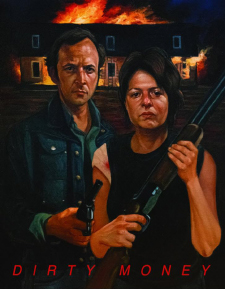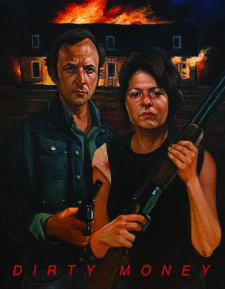Dirty Money (1972) (Blu-ray Review)

Director
Denys ArcandRelease Date(s)
1972 (August 29, 2023)Studio(s)
Cinak Compagnie Cinématographique (Canadian International Pictures/Vinegar Syndrome)- Film/Program Grade: A
- Video Grade: A
- Audio Grade: A
- Extras Grade: A
Review
Don’t let the crude Blu-ray cover art and badly designed back-cover text (impossible to read) dissuade you from watching Dirty Money (La Maudite Galette, 1972), a French-Canadian film virtually unknown outside of Canada. The feature film debut of Denys Arcand, director of the excellent Jesus of Montreal (1989) and The Barbarian Invasions (2004), winner of the Academy Award for Best Foreign Film, Dirty Money is something like a cross between In Cold Blood while anticipating many of the qualities found later in Joel and Ethan Coen’s Blood Simple and Fargo. It’s almost incredible that a picture this good is so obscure.
The story builds slowly, Arcand favoring long takes sometimes lasting minutes. In Quebec, Rolland and Berthe Soucy (René Caron and Luce Guilbeault) are working-class Canadians barely getting by with Rolland’s scrap metal business. Things are so bad they have to rent a room out to Rolland’s long-suffering employee, Ernest (Marcel Sabourin), who mostly keeps to himself in a tiny bedroom. Rolland’s comparatively wealthy uncle Arthur (Léo Gagnon) shows up one night for a visit after five years, bringing $500 as a gift. They and Berthe all get drunk, the Soucys laughing about their mistreatment of Ernest—for days Berthe fed him sandwiches made out of cat food, and complain that after five years of living with them Ernest has never once used his pathetic $30/week salary to buy them gifts of appreciation. The conversation evolves into lingering resentment over Arthur’s alleged stinginess, and he storms out, taking the gift money with him.
Berthe, furious, telephones her criminal brother, Rosaire (Jean-Pierre Saulnier) and his friend, Ti-bi (Gabriel Arcand), inviting them over with a plan to rob Arthur’s money, socked away somewhere in his house, in a home invasion. Rolland is shocked at the very idea, but decides he’d better come along to ensure nothing goes wrong. Instead, EVERYTHING goes wrong, and it’s here where the film becomes a fascinating mixture of unexpected twists, gruesome violence, impromptu sex, and grimly funny moments that seem to come out of nowhere. What unfolds so fascinates I won’t spoil it by revealing anything more.
Though in color and anamorphic Panavision, Dirty Money resembles the black-and-white In Cold Blood in terms of its realism; how a pleasant evening of laughter mere hours later becomes a bloodbath unfolds in a manner that is disturbingly believable. When everything goes awry, that, too unspools in ways that aren’t predictable yet works under its own screwy logic. One example that doesn’t give anything away: while Uncle Arthur does indeed have a fortune stashed under a stairwell, the wealthy man is so cheap that his awesomely ugly house resembles an enormous shoebox.
Arcand’s direction is clever and original throughout. The long takes, oddly enough, work in a way similar to Jacques Tati’s great comedy Playtime. Characters enter and leave the frame; sometimes we can see and hear what’s they’re doing, while at other times they’re just outside the frame and we, the audience, are eager and keenly interested in what’s happening just beyond our line of sight. At Uncle Arthur’s house he keeps a big dog that barks constantly throughout the home invasion, which lasts maybe 15 minutes. The barking piercing the secluded, rural location and night air adds constant tension.
Like Blood Simple and Fargo, there are moments of unexpected humor, including one funny, satisfying sequence that really comes out of nowhere, and probably got a big laugh from movie audiences. And, like the Coen brothers’ films, it doesn’t shy away from graphic violence. One murder at the end is particularly gruesome. Like Blood Simple, Dirty Money was made for pennies, around $150,000, yet look polished and never cheap. The last third or so takes place in Montreal, but most it shows a side of poverty-stricken Quebec that’s a real eye-opener.
The French-Canadian cast, all virtually unknown outside of Canada, is excellent. Their unfamiliarity adds to the picture’s effectiveness; it’s like we’re watching 24 hours in the lives of real Canadians whose lives go completely off the rails.
Dirty Money is presented in a new 4K scan and restoration from the original camera negative and looks superb, while the audio has likewise been restored from the original 35mm magnetic final mix, presented in both 5.1 and 2.0 mixes though, oddly, apparently both are technically mono. The optional English subtitles are likewise excellent.
Terrific supplements abound. They consist of: an audio commentary featuring Canadian film historians Paul Corupe and Jason Pichonsky; Making Money, a new 20-minute interview with director Arcand; Building an Industry, a 23-minute interview with historian Robert Daudelin; new audio interviews with cast members Gabriel Arcand (19 minutes) and Marcel Sabourin (17 minutes); trailers for this and other Arcand films; and a fat booklet featuring a new interview with screenwriter Jacques Benoit.
Dirty Money is a real find, a Blu-ray this reviewer is anxious to share with friends—without telling them anything about it beforehand. I’m only sorry I didn’t see this earlier as it would definitely have made my list of 2023’s best Blu-ray releases.
- Stuart Galbraith IV

